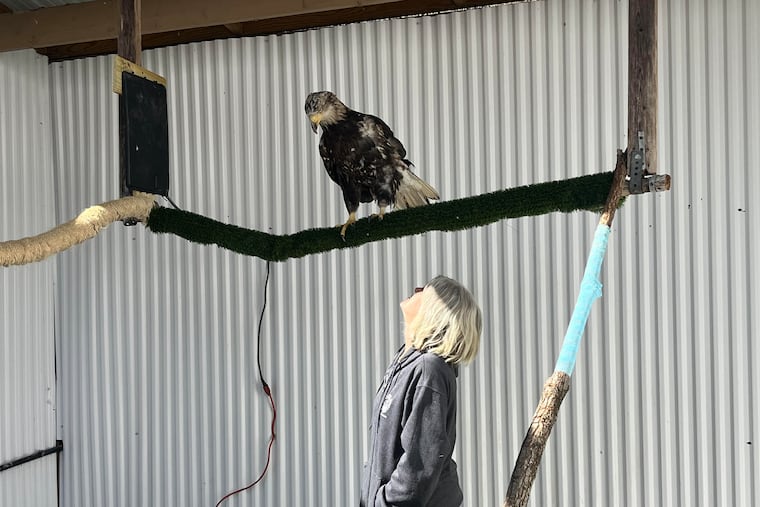Pocono wildlife rehab needs more money to keep saving baby squirrels and wounded raptors
The Pocono Wildlife Rehabilitation and Education Center takes in up 3,500 wild animals per year, including abandoned black bear cubs. Its seeking corporate sponsorship to stay afloat.

Stroudsburg, Pa. — Baby squirrel season came early at the Pocono Wildlife Rehabilitation and Education Center, and the toilet paper donations arrived just in time.
“We need a lot of toilet paper for a lot of little butts,” Kathy Uhler, the center’s founder and education director.
Teachers from the local school district collected donations, mostly trunkfuls of paper towels, Ziploc bags, and toilet paper, from their students and drove them to the 41-year-old wildlife care facility in Monroe County on a Friday in March.
The wildlife center could also use some cash from an angel investor, Uhler and colleagues said, or a corporate sponsor that could commit to continued funding. The nonprofit operates on a $300,000 yearly budget cobbled together from donations and grants. The bulk of the budget goes toward veterinary services and food for the animals, but utilities, property maintenance, and insurance also come into play.
Today, the wildlife center is down to just three paid staffers after financial constraints forced them to lay off three others. The remaining staffers and interns live in a home and former motel on the center’s five acres and took a pay cut.
“I’m down to $10,000 a year,” co-executive director Janine Tancredi said while bottle-feeding baby squirrels. “Right now, we’re skating by week per week.”
There are approximately 27 volunteers, co-executive director Susan Downing said, and while they are the lifeblood of the center — more or less a 24/7 operation — they’re not obligated to show up. The center could also use about 50 more, Tancredi and Downing said.
“We’re looking for corporate sponsorship,” Downing said. “We’d even rename a building.”
Pennsylvania is home to approximately 70 domestic animal shelters, typically taking in just dogs and cats. There are only about 30 wildlife rehabilitation centers, Uhler said, and Pocono takes in just about every animal that lives or lands in Northeastern Pennsylvania. The center is the only facility in Pennsylvania licensed to take in black bear cubs that become permanently separated from their mothers due to car accidents and other issues.
If budget constraints forced the center to close, Uhler said “bear cubs would not have the opportunity to have a second chance at life.”
‘Here, we try to get them healed’
On this Friday morning, there were a slew of baby squirrels on a constant rotation of cleaning and bottle-feeding. Two noisy crows, one an albino named Einstein, were cawing away inside while a raven, one shy porcupine, a handful of owls, and several majestic raptors lived in enclosures outside.
Many of those birds of prey had dead rats or mice splayed out in their cages and pens, and they’re not cheap.
“I think last year, the price of a single rat went up to like $4,” Downing said.
One young bald eagle, named Aegis, hopped around on tree limbs in an expansive flight pen.
“Hey, baby girl,” Downing said to the bird.
Aegis was shot, illegally, and found in a field. The eagle will never fly again, but Downing and Tancredi are trying to get an exhibition permit for educational purposes.
“Most places, if you get a bird with a broken wing, they’re euthanizing,” Uhler said. “Here, we try to get them healed.”
Tancredi, a veterinary technician who grew up in Northeast Philly, got started with domestic animal rescue in Doylestown, Bucks County, and became disheartened to see so many dogs euthanized. Downing grew up on a farm in Bryn Athyn, Montgomery County, and said she’s always had an “intuitive” connection with animals. The two women began teaming up on animal rescues, obtained rehabilitation licenses, and gained a reputation for rescuing animals on the brink and nursing them back to health.
Uhler caught notice and turned the Pocono Wildlife Rehabilitation Center over to them both in 2022. She’s still the center’s education director.
The female bobcat on the property didn’t get a name because she’ll soon be released, back into the wild on state game lands after showing staffers she could hunt and kill live birds.
The center can receive approximately 200 calls a day during the busy spring and summer. Many of those animals have special diets and receive medical attention for issues like broken wings or mange. All told, they’ll take in up to 3,500 animals per year and aim to get most healed up and back into the wild.
“Baby squirrels are usually the first sign of spring,” Tancredi said of the animals, which are often discovered after being abandoned in the wild. “It will start with squirrels, then baby opossums, then raccoons.”
Downing and Tancredi will still answer calls for domestic cats and dogs on occasion because, sometimes, no one else will. Animal control, they said, is often nonexistent in rural areas and some municipalities eliminated the service to cut costs.
“We don’t feel like we can say no,” Downing said, “because, ultimately, we’re in it for the animals.”
Anyone willing to donate to the Pocono Wildlife Rehabilitation Center can visit poconowildlife.com/please-help/.